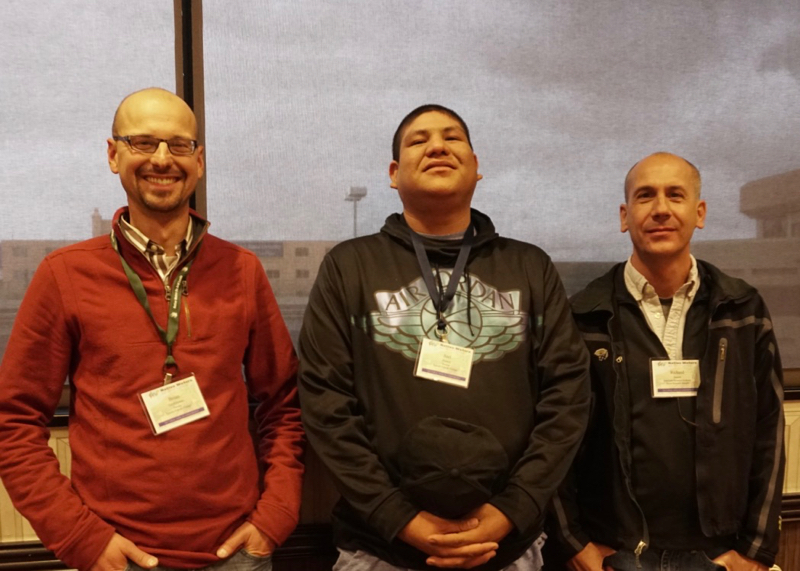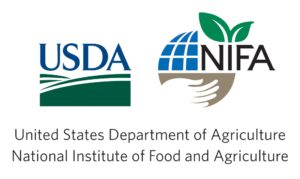Event recap: 2018 Youth Day at the Desert Research Institute
/1 Comment/in Events, News, Project update /by Kelsey FitzgeraldFree webinar: Why conduct a climate change vulnerability assessment?
/1 Comment/in News, Project update, Webinars /by Kelsey FitzgeraldNWAL research partnership to continue at Aaniiih Nakoda College
/19 Comments/in News, Project update /by Kelsey FitzgeraldAfter a successful 2017 season, the Native Waters on Arid Lands (NWAL) Faculty-Faculty Research Partnership with Aaniiih Nakoda College (ANC) in Montana has received new funding from the U.S. Department of Agriculture (USDA) for 2018. This funding will allow for the continuation of a project that was piloted in 2017, in which NWAL team member Richard Jasoni, Ph.D. partnered with ANC faculty member Brian Grebliunas, Ph.D. and ANC student intern Joel Doney to develop a research project in a community demonstration garden.
“We felt like the first season of this project was a really successful experience, with many benefits to all who were involved,” said Jasoni, who works for the Desert Research Institute (DRI) in Reno, Nev. “We are really excited to be able to continue this research partnership with the support from the USDA.”
NWAL’s Faculty-Faculty Research Partnership pairs faculty from research institutions such as DRI with faculty from Tribal Colleges and Universities (TCUs) to develop and build capacity for research at Tribal Colleges. Goals of the program are to help establish new scientific research programs at TCUs, and to help students gain hands-on research experience that they can use to help local communities, pursue undergraduate or graduate work, or pursue any number of careers in their field of study.

Student Joel Doney of Aaniiih Nakoda College researched irrigation application techniques during his 2017 summer internship with the NWAL research partnership program.
2017: A successful pilot season
The 2017 pilot project was designed to give Doney hands-on research experience by involving him in all aspects of the research study design, study setup, data collection, and data analysis. In the study, Jasoni, Grebliunas and Doney used the yellow onion (Allium cepa) as a test-species to investigate three research questions related to water use on arid lands: 1) Does reducing the amount of irrigation water application affect crop yield? 2) Does reducing the amount of irrigation water application affect soil moisture within the soil profile? And, 3) Does reducing the amount of irrigation water application affect soil nutrient content?
Their study results showed that reducing the amount of irrigation water resulted in smaller crop yields, lower levels of soil moisture, and had a significant effect on soil ammonia availability. The reduced irrigation treatment was not found to have a significant effect on dissolved phosphorous levels.
Plans for 2018
During the 2018 season, with new USDA support (grant 2017-38424-27076), the research team plans to continue to investigate the effects of water management on crop production. This year’s experiment will compare the effects of subsurface irrigation vs. aboveground sprinkler irrigation on soil moisture, soil nutrient levels and crop yield.
“We hope that this research experience is valuable to Doney in his career – and that our study results will provide insight into water management that will be useful to the ANC community and anyone growing crops in arid regions,” Jasoni said.

Brian Grebliunas, Joel Doney and Richard Jasoni at the 2017 NWAL Tribal Summit in Sparks, Nevada. November 2017.
Upcoming events: Youth Day and R Short Course at Salish Kootenai College – May 3-5, 2018
/19 Comments/in Events, News, Project update /by Kelsey FitzgeraldThe Native Waters on Arid Lands (NWAL) team is pleased to announce two events that will take place May 3-5, 2018 at Salish Kootenai College (SKC) on the Flathead reservation in western Montana. The events include:
- May 3, 2018: Youth Day with SKC and NWAL faculty and high-school students from the Confederated Salish and Kootenai Tribes (CSKT).
- May 3-5, 2018: Short Course on R for Environmental Analysis (view flyer) focusing on environmental data and analysis on the Flathead reservation and targeted towards SKC faculty, students, and CSKT resource managers.
Event Details
Thursday, May 3, 2018 — SKC Youth Day
Organized by Meghan Collins and Virgil Dupuis
Modeled after a highly successful Youth Day held at DRI in November, 2017, the SKC Youth Day will consist of a full day of activities around the themes of landscape, environment, and sustainability. Participants will be from the EAGLES—Environmental Advocates for Global and Ecological Sustainability—a grades 10–12 student club organized by the CSKT. EAGLES students will engage with SKC faculty and NWAL scientists in activities that connect traditional values and knowledge to sustainability and resilience.
Currently scheduled sessions and session leaders include:
- Geo-cultural landscape of the Flathead basin — walk and look around tour on SKC campus (Tony Berthelote, SKC)
- Tree-ring records for climatology, fire history, and forest health (Rick Everett, SKC)
- Climate Myths versus Facts (Meghan Collins, DRI)
- The importance of values in debating carbon draw-down strategies—in-ground composting for sustainable gardens demonstration/participation (Scott Goode/Anna Eichner, DRI/Nourishing Systems)
- Native plants and restoration — participation in a native plant restoration project on SKC’s campus (Virgil Dupuis, SKC)
Friday & Saturday, May 3–5, 2018 — Short Course in R for Environmental Analysis
Organized by Kyle Bocinsky, Tracy Bowerman, and Christine Albano
This three-day, intensive short course will focus on transferring environmental knowledge and skills to SKC faculty, students, and CSKT resource managers. Conversations with SKC staff have revealed a need for training in open-source tools for GIS and environmental analysis, and for the dissemination of knowledge about where to retrieve environmental data for their local communities, and the skills necessary to process and analyse those data. The short course will be an introduction to the R statistical language and its geospatial and geostatistical capabilities. Participants will learn how to import, manipulate, and graph tabular data in R; calculate summary statistics for those data; import spatial data including point, line, polygon and gridded data; perform basic geospatial information system actions like cropping, masking, and dissolving geometries, and calculating statistics about spatial objects; and visualizing spatial data using interactive web maps. Participants will be introduced to several publicly available environmental datasets including the USDA-NRCS SSURGO soils data; elevation, hydrography, landcover, and boundary data from the US National Map; and the NorWeST stream temperature database which is especially important for monitoring fisheries on the Flathead reservation and across Montana. Short course participants will receive a set of training scripts tailored to the Flathead reservation for analyzing these environmental data. Dr. Tracy Bowerman, professor of Wildlife and Fisheries at SKC, will co-develop the short course with NWAL team members Kyle Bocinsky and Christine Albano. Due to Dr. Bowerman’s initiative, we expect to be able to offer this short course to SKC students for college credit, and we are planning for broad participation of 20–25 people.
Event recap: Youth Day and the 2017 Tribal Summit
/1 Comment/in Events, News, Project update /by Kelsey Fitzgerald2016 Project Update
/18 Comments/in Project update /by Kelsey FitzgeraldAs the Native Waters on Arid Lands (NWAL) project enters its second year, we are working with nine tribal partners in the Great Basin and American Southwest to address important questions related to climate change and landscape use patterns on tribal reservations. During the course of the past year, we have worked to fine-tune our project plan, develop a scope of work, and begin data collection. Here are some key milestones and research activities completed by the NWAL team during 2015-2016.
Selecting tribal partners
The NWAL team selected a diverse group of nine tribal partners for in-depth study. Of the 28 tribes/reservations located within the proposed geographic research area, we looked at criteria such as: size of reservation (land area and population), water entitlements, existing working partnerships (FRTEP, 1994 and others), existing agriculture, economic reliance on agriculture, year of establishment, and others. The nine tribes/reservations that we selected are:
- Pyramid Lake Paiute Tribe
- Navajo Nation
- Hopi Tribe
- Shoshone-Paiute Tribes of Duck Valley
- Colorado River Indian Tribes
- Ute Indian Tribe of Uintah and Ouray
- Zuni Tribe
- Walker River Tribe
- Gila River Tribe
Developing research questions
To learn about the impacts of climate change and evaluate adaption options for sustaining water resources and agriculture on these reservations, the NWAL team developed a set of research questions in the areas of (1) climatic and ecological change, (2) traditional knowledge, (3) agricultural economics, and (4) production agriculture infrastructure. Sample research questions include:
- How have the climate and landscape patterns changed over last 2000 years?
- How is the climate projected to change on reservation lands and in the drainage basins they depend on in next 50-100 years?
- How is traditional knowledge reflected in current agriculture practices?
- What are the infrastructure barriers to sustaining, improving, and/or modifying current agricultural practices?
Collecting data
NWAL researchers are working with each of the nine tribal partners to seek answers to our research questions. Using secondary data sources, researchers are gathering information related to land tenure, water rights, climate data, ecological systems, watersheds, economics, traditional knowledge, traditional agricultural practices and infrastructure, and tribal governance. In coming years, NWAL researchers will supplement this secondary data with primary data from focus groups, interviews, and face-to-face or online surveys with members from each tribe. This information will help the NWAL team to better understand historical and modern-day conditions on the reservations, and will help identify information and resource needs that will help tribes adapt to climatic changes.
Next steps
The NWAL team is currently working on a knowledge management system/data portal for sharing information. We are developing integrated research/outreach plans for each of four program areas (Climate Science and Adaptation; Agricultural Production Economics; Traditional Knowledge and Agriculture; Agricultural Irrigation and Infrastructure). We are developing a Native Waters Advisory Group (NWAG), to be made up of representatives from each of the nine reservations in the study area.
Finally, we are preparing for the second NWAL Tribal Summit, which will be held in Las Vegas on November 9-10, 2016. Please join us for two days of workshops and talks on topics such as tribal water rights, strengthening tribal economies through innovative water use, tribal rangeland and livestock conservation practices, traditional knowledge and ecology, and more!
About
The Native Waters on Arid Lands project seeks to enhance the climate resiliency of agriculture on American Indian lands of the Great Basin and Southwest by building the capacity within tribal communities to develop and implement reservation-wide plans, policies, and practices to support sustainable agriculture and water management.
Business Hours
Our support Hotline is available 24 Hours a day: (555) 343 456 7891
- Monday-Friday: 9am to 5pm
- Saturday: 10am to 2pm
- Sunday: Closed
Latest News
 Rainwater Harvesting on the Hualapai Reservation: New Research by Brianda Hernandez RosalesAugust 1, 2022 - 10:41 pm
Rainwater Harvesting on the Hualapai Reservation: New Research by Brianda Hernandez RosalesAugust 1, 2022 - 10:41 pm Maureen McCarthy/DRINew USDA Grant to Support Climate Resilience Planning in Indian CountryJanuary 13, 2022 - 5:59 pm
Maureen McCarthy/DRINew USDA Grant to Support Climate Resilience Planning in Indian CountryJanuary 13, 2022 - 5:59 pm- Presentations from FALCON Conference now availableDecember 14, 2021 - 8:13 pm

